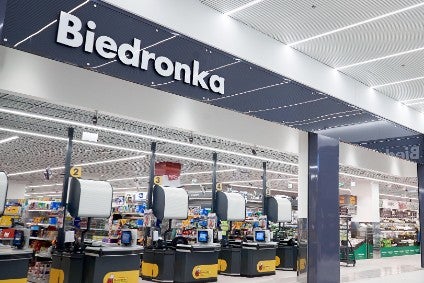
Biedronka, the largest food retailer in Poland by market share, is to launch a legal fight over a fine issued on the business by the country’s competition watchdog.
UOKiK, Poland’s Office of Competition and Consumer Protection, has hit Biedronka with a penalty of PLN723m (US$198.6m) for unfairly asking suppliers for discounts.

Discover B2B Marketing That Performs
Combine business intelligence and editorial excellence to reach engaged professionals across 36 leading media platforms.
The watchdog said Biedronka, owned by Portugal-based retailer Jeronimo Martins, had demanded the discounts after contracts were signed.
UOKiK said the requests – which it claimed affected more than 200 suppliers, principally of fruit and vegetables – were made “as soon as it has become aware of the sales results for a given period. They lead to an unexpected price reduction, [a] drop in earning results and margins as well as [hindering the] planning of business operations on the supplier’s part”.
Manufacturers accepted the demands, the watchdog claimed, because they were threatened with fines. UOKiK added: “Due to Biedronka’s market power, suppliers were accepting unfavourable conditions as they feared that termination of the cooperation would result in even bigger financial losses.”
Tomasz Chróstny, UOKiK’s president, insisted Biedronka was “applying an unfair mechanism that consisted in arbitrary reduction of remuneration for its counterparties for the deliveries made”.

US Tariffs are shifting - will you react or anticipate?
Don’t let policy changes catch you off guard. Stay proactive with real-time data and expert analysis.
By GlobalDataChróstny added: “What is essential is that the additional discounts earned from food suppliers were not translated into lower prices of products for the Biedronka’s customers. This is an absolutely unacceptable use of market power by the commercial network. In view of the fact that for many business entities the supplies for Biedronka constitute a significant production volume, they were bearing immense costs. The fine had to be adequate to the breach of laws, burdensomeness of the practice and level of benefits earned unfairly by the Portuguese network.”
Biedronka said it did not accept UOKiK’s verdict, nor the fine, describing the judgment “biased, lack[ing] both legal and factual grounds and is therefore unfair and undeserved”.
The retailer added: “UOKiK has reached such decision without observing due process of law and without even listening to the suppliers at stake. The biggest number of suppliers identified in the case are processed food suppliers. Contrarily to what UOKiK announced, fruits and vegetables suppliers are represented in a very small number and those represented are mainly traders and importers. UOKiK’s decision shows misunderstanding of the nature of business operations and of the dynamics of the inherent negotiations. The particular discount publicly mentioned by UOKiK is in fact agreed upfront between parties and applied to the turnover of the defined period.
“We will dispute this decision in court with all our strength, arguments and commitment. We have confidence that the Polish courts will address this case with objectivity and impartiality and that justice will be made.”
UOKiK has also been analysing discounts obtained by other retailers operating in Poland.
“The fine for Jeronimo Martins Polska – the owner of the Biedronka commercial network – is the warning for other networks that similar practices will be severely fined by the authority,” Chróstny added. “The opportunity for the avoidance of afflicting sanctions is the immediate change of the mechanisms of retroactive discounts unfavourable for suppliers. The way from the producer to the consumer goes through suppliers and sellers, including commercial networks – fairness of relationships among them and mutual responsibility are the factors on which the stability of farms and foodstuff producers, the development of the entire agricultural and food sector as well as the food security of Poland depends.”





